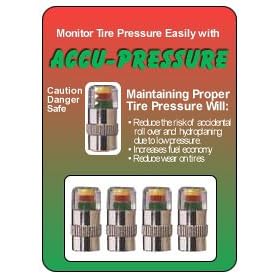bought a honda accord in august this year . it's a fine running car withs LOTS of doodads .
one of them is the TPS (tire pressure monitoring system) . the car is shod with 17 inch alloys and michelin tires - tire pressuree 32 pounds .
when the first coldspell hit in early december : the TPS lit up !
checked tire pressure : down to 28 pounds .
phoned honda : just re-inflate and all will be fine .
inflate (in the cold) to 32 pounds - all fine .
about dec. 20 : purchased and had installed a set of michelin snows at the tire store .
instructions : please set pressure at 32 .
(later recalled that it was VERY HOT in the shop and about MINUS 15 C outside )
driving home : TPS comes on !
next day back to tire store - head scratching - mumbling - up on the hoist ...
tire store : alloy wheels have a tendency to leak - get steel rims !
drive home : TPS comes on !
next day phoned honda salesman : yes , he had heard of the light coming on in extreme cold , probably o.k.to drive , if you didn't have TPS you wouldn't have noticed , will talk to shop .
salesman calls back : yes , tire installer confirmed problems , don't worry ... ...
cannot install steel rims unless they have TPS - VERY expensive if available at all !
next day : remembered an old Mechanics Illustrated article from about 40 years ago .
feature writer UNCLE TOM (tom mccahill ?) recommended that one always put some extra air in the tires !
inflated tires to 36/37 pounds : no more TPS light coming on !
i'll still be talking to honda . doesn't seem to make any sense to have a TPS and being told to ignore it .
rechecked tirepressure and it is now holding .
anyone had a similar experience with alloys and TPS when the temperature dropped below freezing ?
does anyone use tire caps with pressure monitor ? do they work ?
